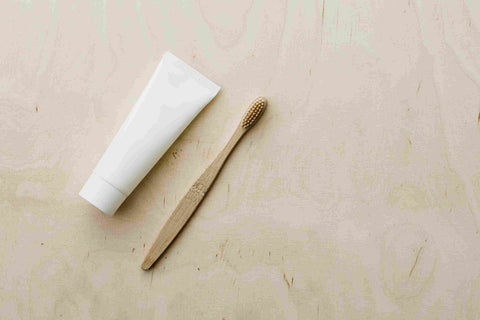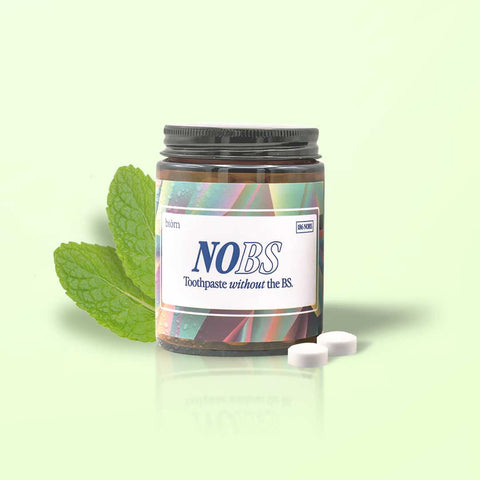Why Avoid Fluoride in Toothpaste?
It's essential to consider limiting the amount of fluoride consumed and avoiding toothpaste that contains fluoride, particularly for pregnant women and children.
Avoiding fluoride in your toothpaste may be wise to reduce the potential risk of long-term oral and dental health problems.
While fluoride has been recognized for its dental benefits, research suggests that fluoride-free toothpaste with nano hydroxyapatite is just as effective but without systemic toxicity concerns.
This article will explain everything you need to know about why you should avoid fluoride and alternatives like fluoride-free toothpaste.
What is fluoride in toothpaste?

Fluoride toothpaste contains fluoride, a remineralizing agent that helps strengthen your enamel to fight off the acids created by the pesky bacteria in your mouth.
Fluoride is a naturally occurring mineral released from rocks into soil, water, air, and certain foods.
Studies suggest that its presence in toothpaste is primarily due to its effectiveness in addressing various dental concerns, such as:
- Cavity prevention
- Plaque reduction
- Preventing tooth decay
- Strengthening tooth enamel
Plus, sodium fluoride is used to relieve sensitive teeth and help your teeth rebuild themselves. This is particularly important if you have a diet heavy in acidic foods like coffee and citrus.
Further, public water in the United States is treated with fluoride which can lead to many people consuming or using fluoride in excess.
While fluoride toothpaste has been the traditional standard in oral care for decades, fluoride-free toothpaste is gaining popularity as it uses natural ingredients that provide equivalent dental benefits without the potential risks.
Counterarguments for Using Fluoride Toothpaste
While many people believe in the benefits of fluoride-free toothpaste, particularly those with nano hydroxyapatite, it's important to acknowledge the broader context in which fluoride is used in dental care.
The American Dental Association recognizes fluoride as a safe and effective agent for preventing tooth decay in both children and adults, particularly through community water fluoridation and topical applications like toothpaste.
Scientific Support for Fluoride
Fluoride's role in dental health is backed by extensive research. It's known for strengthening tooth enamel and making it more resistant to decay, a benefit that is especially significant in areas with higher risks of dental caries.
Fluoride in Public Health Initiatives
Fluoride is often added to public water supplies as a cost-effective measure to reduce dental caries across communities. This practice has been credited with significantly lowering the prevalence of cavities, particularly among children.
A Balanced Perspective
While excessive fluoride can lead to conditions like dental fluorosis, the concentration in toothpaste and water is generally controlled to minimize this risk.
The ADA suggests that the benefits of fluoride in preventing tooth decay generally outweigh the risks when used as directed.
How Does Fluoride Toothpaste Work?
Fluoride toothpaste works by remineralizing your enamel.
Demineralization naturally occurs in your teeth when plaque bacteria consume sugars and carbohydrates, producing acidic saliva that damages tooth enamel. Fluoride helps teeth resist demineralization by managing and preventing dental caries.
On the other hand, when saliva becomes less acidic, fluoride replenishes calcium and phosphate ions to build and protect teeth from decay. This helpful process is known as remineralization and creates a layer of fluorapatite on your teeth.
Plus, research mentions that the regular use of fluoridated dental products like:
- Toothpaste
- Mouthwash
- Dental varnishes
- Dental gel
- Fluoridated water
can work effectively to help maintain healthy teeth and gums, prevent tooth sensitivity, and aid pain from tooth decay.
Is fluoride safe?

Yes, fluoride is generally considered safe when used appropriately and in recommended amounts for certain populations. It has been extensively studied and recognized by leading health organizations, including the American Dental Association (ADA) and the World Health Organization (WHO), for its effectiveness in preventing tooth decay and promoting oral health.
Fluoride occurs naturally in water sources and is also added to dental products like toothpaste and mouthwash to help strengthen tooth enamel and reduce the risk of cavities. However, excessive fluoride intake can lead to dental fluorosis, a condition characterized by white spots or streaks on the teeth, or skeletal fluorosis.
Additionally, research suggests that fluoride intake is associated with lower IQ scores in children.
While fluoride is commonly used in toothpaste for its ability to prevent tooth decay and strengthen enamel, you may prefer fluoride-free alternatives due to concerns regarding potential adverse effects associated with fluoride exposure. For example, those with fluoride sensitivities or allergies may experience discomfort or irritation when using fluoride-containing toothpaste.
Further, parents and pregnant women may opt for fluoride-free toothpaste formulations to maintain good oral health without the potential drawbacks associated with fluoride exposure. Thankfully, fluoride-free toothpaste with nano hydroxyapatite exists as a safe and effective alternative to fluoridated toothpastes.
Nano hydroxapatite is an inorganic chemical compound that closely mimics that natural composition of our teeth and bones. Not only are hydroxyapatite-based toothpastes safe, but nano hydroxyapatite is equally as effective as fluoride at remineralization and improving oral hygiene.
Risks and Systemic Effects of Fluoride Toothpaste

The use of fluoride offers significant benefits for oral health. However, it's essential to be aware of potential risks, including:
Dental Fluorosis
Dental fluorosis is a dental issue that occurs when a child is exposed to excessive fluoride, typically before the age of 8 during the teeth-forming years.
It is characterized by discoloration or pitting of the tooth enamel, ranging from mild white spots or streaks to more visible brown discoloration and, in severe cases, pits in the teeth.
Most cases are mild, and while it's generally considered a cosmetic concern rather than a health issue, severe fluorosis can cause more noticeable changes.
The risk of fluorosis primarily affects children who tend to swallow toothpaste instead of spitting it out.
Skeletal Fluorosis
This rare but serious health condition occurs when an individual is extremely exposed to excessive fluoride intake over an extended period.
This condition affects the bones and joints, causing pain and limited mobility.
While dental fluorosis primarily affects the teeth's appearance, skeletal fluorosis impacts the structural integrity of bones and joints.
Fluoride Toxicity
Fluoride toxicity, or fluorine poisoning, is a rare but severe condition resulting from excessive exposure to high fluoride levels.
It can lead to symptoms like:
- Abdominal pain
- Nausea
- Vomiting
- Muscle weakness
In severe cases, life-threatening complications.
Fluoride Allergies
Some individuals may be allergic or hypersensitive to fluoride, which can lead to:
- Oral discomfort
- Rashes
- Itchiness
- Gastrointestinal issues
In fact, studies suggest that swallowing fluoride toothpaste, especially by children, can result in gastrointestinal discomfort. Supervising young children during brushing is crucial as recommended by the American Academy of Pediatrics.
Meanwhile, research indicates the significance of monitoring and regulating fluoride exposure in water sources, particularly in regions with naturally high fluoride concentrations, to mitigate the risk of chronic fluoride toxicity.
Given the potential risks associated with fluoride consumption, it makes sense to look for a safer option to protect the health of your whole family.
Pros and Cons of Fluoride Toothpaste
In the debate over fluoride in toothpaste, it's essential to consider both its benefits and drawbacks to make an informed decision.
Here's a balanced look at the pros and cons of fluoride use:
Pros of Fluoride:
- Cavity Prevention: Fluoride is proven to be effective in preventing cavities by remineralizing tooth enamel and reversing early signs of tooth decay.
- Enamel Strengthening: It helps in strengthening tooth enamel, making it more resistant to acid attacks from plaque bacteria and sugars in the mouth.
- Widespread Benefits: As mentioned earlier, fluoridation of community water supplies has been a successful public health strategy for reducing the prevalence of dental caries in populations.
Cons of Fluoride:
- Risk of Dental Fluorosis: Excessive fluoride, especially during the early years of tooth development, can lead to dental fluorosis, characterized by changes in the appearance of tooth enamel.
- Potential Toxicity: In high doses, fluoride can be toxic, leading to serious health issues. This is a particular concern when fluoride is ingested in large amounts.
- Individual Sensitivity: Some individuals may have a lower tolerance or sensitivity to fluoride, necessitating the need for alternative dental care options.
While fluoride has its benefits, these concerns highlight the importance of using it cautiously, especially in children.
This is where fluoride-free alternatives like nano hydroxyapatite toothpaste tablets can offer effective dental care without the associated risks of fluoride.
Guidelines for Safe Fluoride Use
For those of you who choose to use fluoride toothpaste, especially for your children, it's crucial to do so safely to minimize any potential risks.
Here are some guidelines for safe fluoride use:
-
Appropriate Amount: For children under three years, use only a smear (the size of a grain of rice) of kids toothpaste. Children aged three to six should use no more than a pea-sized amount.
-
Supervised Brushing: Always supervise children while brushing to ensure they use the correct amount of toothpaste and avoid swallowing it.
-
Spitting Out Toothpaste: Teach children to spit out toothpaste after brushing and avoid rinsing with large amounts of water, as this can help minimize ingestion of fluoride.
-
Regular Dental Check-ups: Consult with your dentist about the appropriate use of fluoride toothpaste for your family, especially if you have concerns about fluorosis or other fluoride-related issues.
-
Understanding Fluoride Levels: Be aware of the fluoride levels in your drinking water and consider this when choosing dental care products.
By following these guidelines, you can help ensure that fluoride is used effectively and safely, particularly in protecting children's developing teeth.
Finally, remember that generally, kids should not use adult toothpaste. For best results, stick to kids hydroxyapatite toothpaste instead.
Is fluoride toothpaste safe for infants and young children?
Good oral health is essential from an early age.
According to the American Academy of Pediatrics, as soon as infants begin to develop teeth, parents should transition to using a toothbrush and fluoride toothpaste, applying only a small amount—about the size of a grain of rice.
However, it may be wise to consider using fluoride-free toothpaste with nano hydroxyapatite as an alternative, as it can effectively support enamel health without the risks associated with fluoride ingestion.
Alternatives to Fluoride Toothpaste

If you're concerned about fluoride, don't worry - there are natural alternatives!
One alternative to fluoride toothpaste is remineralizing toothpaste with nano hydroxyapatite (often referred to as nHA).
In fact, in some countries like Japan, nHA has been considered the top choice for decades for preventing cavities and helping with enamel remineralization.
Research has shown that nano hydroxyapatite can work as well and may be more effective than fluoride as:
- Desensitizing agent
- Remineralization of enamel
- Prevent tooth decay
- Remove dental plaque
- Fights gum disease
- Teeth whitening
Thanks to these benefits, nHA is an excellent option for those who prefer to avoid fluoride.
Should you use fluoride-free toothpaste?
Yes, you should use fluoride-free toothpaste tablets to not only improve your oral health just as well as (if not better than) fluoridated toothpaste, but they also come with the added benefits of being mess-free, cruelty-free, and travel-friendly.
Plus, some fluoride-free toothpaste is even formulated with nano hydroxyapatite, which has been proven to:
- Remove plaque buildup
- Minimize sensitive teeth
- Reduce bad breath
- Whiten teeth
Hydroxyapatite toothpaste tablets are definitely the healthier choice for kids, pregnant women, and those individuals looking to avoid harmful ingredients.
Fluoride vs Fluoride-Free Toothpaste

Fluoride-free toothpaste enriched with nano hydroxyapatite is the preferred toothpaste option due to fewer systemic effects than fluoride toothpaste.
Studies show that nano hydroxyapatite may be as effective as fluoride while making your teeth enamel remineralize and reduce sensitivity.
What's more, nano hydroxyapatite is also biomimetic and nontoxic, designed to cater to those who prefer a more natural approach to oral care. It's also safer for kids and pregnant women!
In contrast, fluoride toothpaste carries the risk of fluorosis, potential allergic reactions, and even toxicity in excessive use.
Thus, when comparing fluoride-free toothpaste with nano hydroxyapatite to conventional fluoride toothpaste, the NATURAL choice clearly wins!
What are other ways to keep my teeth strong?
In addition to using toothpaste tablets, there are several ways to enhance your dental health, such as:
- Limiting sugary foods and drinks
- Visiting your dentist regularly
- Flossing every day
- Tongue scraping
- Use of Mouthwash
- Avoiding oral piercings
- Quitting smoking
Summary: Why avoid fluoride in toothpaste?

You can avoid fluoride in your toothpaste to reduce the risk of potential dental issues, and opt for a safer, eco-friendly, mess-free, and cruelty-free option.
While fluoride has advantages, fluoride-free toothpaste with nano hydroxyapatite offers similar benefits without the potential drawbacks.
With nano hydroxyapatite toothpaste, you get all the dental benefits without the worries.
Sounds like a smart move, don't you think?
Frequently Asked Questions
What is fluoride in toothpaste?
Fluoride in toothpaste is a remineralizing agent that strengthens tooth enamel and helps prevent issues like cavities, plaque, tooth decay, and sensitive teeth.
Is fluoride in toothpaste bad for you?
Fluoride in toothpaste is generally safe and helps prevent tooth decay by strengthening enamel. Overexposure, especially from multiple sources, can cause mild conditions like dental fluorosis, but this is usually cosmetic. When used as directed, fluoride toothpaste provides significant dental benefits with minimal health risks.
How does fluoride toothpaste work?
Fluoride toothpaste works by remineralizing enamel, reversing the effects of demineralization caused by acidic saliva, and helping to protect teeth from decay.
What are the potential risks of using fluoride toothpaste?
Potential risks of using fluoride toothpaste include dental fluorosis (tooth discoloration), skeletal fluorosis (bone and joint issues), fluoride toxicity, and allergies or hypersensitivity to fluoride.
What are the alternatives to fluoride toothpaste?
An alternative to fluoride toothpaste is fluoride-free toothpaste with nano hydroxyapatite (nHA), which offers benefits like desensitization, enamel remineralization, cavity prevention, plaque removal, and gum disease prevention.
Why should I choose fluoride-free toothpaste with nano hydroxyapatite?
Fluoride-free toothpaste with nano hydroxyapatite is a safer option as it provides dental benefits similar to fluoride but with fewer risks, making it an excellent choice for those concerned about potential fluoride-related issues, including pregnant women and children.
Can fluoride free toothpaste cause cavities?
No, fluoride-free toothpaste does not directly cause cavities, but it may lack protection against demineralization if without nano hydroxyapatite. To protect your teeth, use a toothpaste with a remineralizing agent like nHA, which helps strengthen enamel and prevent decay.
Is fluoride safe?
Yes, fluoride is generally safe when used in recommended amounts, like in toothpaste and drinking water, as it helps prevent tooth decay. However, overconsumption can lead to dental fluorosis, so it's important to use it in moderation. If you're concerned, it may be best to limit fluoride use or opt for fluoride-free alternatives.
Is fluoride toxic?
Fluoride can be toxic in high doses, but the levels used in dental products and community water supplies are considered safe and beneficial for preventing tooth decay. Acute fluoride toxicity may lead to symptoms such as nausea, vomiting, and abdominal pain, particularly if large amounts are ingested. However, when used as directed, fluoride is generally safe and effective for dental health.
What does fluoride do to your body?
Fluoride primarily strengthens dental enamel, making teeth more resistant to decay and helping to prevent cavities. It can also promote the remineralization of teeth that have begun to decay, restoring lost minerals and reversing early signs of tooth damage. Additionally, fluoride may have some benefits for bone health, although excessive exposure can lead to fluorosis or other health issues.
Is fluoride good for your teeth?
Yes, fluoride is beneficial for your teeth as it helps strengthen dental enamel, making it more resistant to decay and aiding in the remineralization process. However, fluoride-free toothpaste can also be a good option, especially for those who prefer to avoid fluoride due to personal preferences or concerns. These alternatives often contain natural ingredients that can help maintain oral health and support enamel without the risks associated with fluoride ingestion.
Why use fluoride-free toothpaste?
Using fluoride-free toothpaste can be beneficial for several reasons. Some individuals prefer to avoid fluoride due to concerns about potential toxicity, especially for young children who may swallow toothpaste. Additionally, fluoride-free options often contain natural ingredients that support oral health, such as baking soda or herbal extracts, which can effectively clean teeth and freshen breath without the risks associated with fluoride.
Is fluoride-free toothpaste effective?
Yes, fluoride-free toothpaste can be effective, especially if it contains ingredients like nano-hydroxyapatite, xylitol, and other natural components such as those found in NOBS Toothpaste tablets. These ingredients help clean teeth, reduce bacterial growth, and protect enamel.
What is a negative side effect of fluoride?
Excessive fluoride exposure can lead to dental fluorosis, which causes white or brown spots on teeth. In high amounts, fluoride can also weaken enamel instead of strengthening it. Some people may experience irritation or sensitivity from fluoride-containing products.
Is it OK to use fluoride every day?
Fluoride can be used daily in recommended amounts to help prevent cavities and strengthen enamel. However, excessive use may lead to fluorosis or irritation, especially in children who swallow toothpaste. For a safer alternative, nano-hydroxyapatite toothpaste can help remineralize enamel without the risks of fluoride overuse.






















